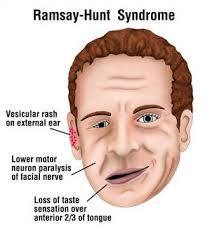
Ramsay Hunt syndrome or RHS (herpes zoster oticus) occurs when a shingles outbreak affects the facial nerve near one of the ears.
RHS is a peripheral facial palsy. About 12% of peripheral facial palsy cases are associated with RHS.
It was Dr J. Ramsey Hunt, the physician who first described the syndrome at a meeting of the American Neurological Association in 1906

.
What is the cause?
RHS is caused by reactivation of the varicella-zoster virus (VZV) within the dorsal ganglion of the Facial Nerve, the 7th Cranial Nerve.
The virus results in inflammation of the geniculate ganglion of cranial nerve VII.
It is the same virus that causes chickenpox.
After chickenpox clears up, the virus still lives in our nerves. Years later, it may reactivate. When it does, it can affect the facial nerves
As the 8th cranial nerve or the auditory nerve AKA the vestibulocochlear nerve, lies next to the sensory ganglion of the facial nerve within the facial canal, both nerves are usually involved
Triad of RHS

It consists of facial paralysis, otalgia, and vesicles near the ear and auditory canal.
Risk factors
Typically affects people older than 60. Ramsay Hunt syndrome is rare in children.·
Ramsay Hunt syndrome isn't contagious. However, reactivation of the varicella-zoster virus can cause chickenpox in people who haven't previously had chickenpox or been vaccinated for it.
The infection can be serious for people who have immune system problems.
Risky for newborns and pregnant women
Wondering what could be the symptoms?

Facial muscle weakness and deafness.
A painful red rash with fluid-filled blisters or vesicles on, in and around one ear with facial weakness or paralysis on the same side as the affected ear
Ear pain (otalgia)
Hearing loss
Ringing in your ears (tinnitus)
Difficulty closing one eye
Repetitive, uncontrolled movements of eyes
A sensation of spinning or moving (vertigo)
A change in taste perception or loss of taste
Dry mouth and eyes
Temporal headaches
Complications??? Yes, there can be a few of them!!!
Permanent hearing loss and facial weakness
Eye damage
Postherpatic neuralgia or persistent pain.
Management
Corticosteroids and antiviral medication
Care of the eye in order to prevent the formation of corneal ulcer
Physical Therapy Management
Same as Physiotherapy management of the facial paralysis or weakness. Also, refer to our previous blog on facial palsy here
Neuromuscular retraining (NMR) for recruiting the appropriate muscles
Electromyography (EMG) and mirror biofeedback
Trophic electrical stimulation (TES)
Proprioceptive neuro muscular facilitation (PNF) techniques
Soft tissue mobilization of facial muscles
coordinated Exercises between both sides of the face and to reduce synkinesis
Kabat technique
Prognosis
Chances of full recovery are better if the treatment is started within 72 hours after onset. If treatment is delayed for more than 72 hours, there is less chance of complete recovery.
Some may develop some degree of synkinesis.
Some may be left with the complications as discussed earlier.
Difference between RHS and fascial palsy
It is now known that varicella zoster virus (VZV) causes Ramsay Hunt syndrome. Compared with Bell's palsy (facial paralysis without rash), patients with Ramsay Hunt syndrome often have more severe paralysis at onset and are less likely to recover completely.
Researches:
The condition is self-limiting, but treatment is targeted at decreasing the total duration of the illness as well as providing analgesia and preventing the complications that can occur. This activity reviews the role of the interprofessional team in the diagnosis and treatment of Ramsay Hunt syndrome.
After Bell's palsy, the rate of synkinesis development is roughly 16%, but it is closer to 40% after Ramsay Hunt syndrome.
RHS may initially be indistinguishable from Bell’s Palsy due to delayed development of vesicles after the onset of facial weakness.
Based on each individual’s signs, symptoms and side effects treatment interventions can be tailored to improve deficits for improved quality of life and function.
This study suggested that rehabilitation program with NMES, facial massage and biofeedback exercise are safe, efficacious and provide good outcomes in the treatment of Ramsay Hunt Syndrome.
RHS may cause repeated falls and Fear Of Falling (FOF), leading to impairment in daily activities and psychosocial function in older adults. Therefore, clinicians should be mindful of falls and FOF when caring for older patients with RHS and should develop multidimensional strategies for fall prevention and FOF.
At Valley Healing Hands, we provide the best Physical Therapy for Ramsay Hunt Syndrome. Our physical therapist are highly skilled and will be more than happy to assist you reach your goal. We provide customized treatment plans as per the requirements of our patients. Our patients are totally satisfied with our services. You may learn about what they have to say about us here and get connected to us here. Our patients love us and you too, will!!!
Sources


Comments